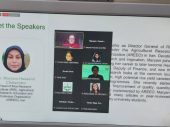Dr. Hosseini, Director- General of Rice Research Institute of Iran shared her experiences in Women in research and extension: Advancing gender equality in innovation, Asian Pacific regional webinar
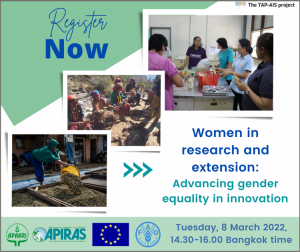 To celebrate International Women’s Day in the Asian Pacific regional webinar. Inspiring women working in agricultural research, extension, and policy in Bangladesh, Bhutan, Cambodia, India, Indonesia, Iran, and the Pacific Islands shared their stories of success, challenges, and lessons as innovators and influencers of change in the Asia-Pacific region.
To celebrate International Women’s Day in the Asian Pacific regional webinar. Inspiring women working in agricultural research, extension, and policy in Bangladesh, Bhutan, Cambodia, India, Indonesia, Iran, and the Pacific Islands shared their stories of success, challenges, and lessons as innovators and influencers of change in the Asia-Pacific region.
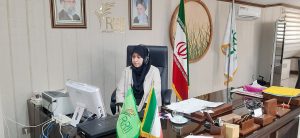 This ceremony was held on Tuesday, March 8, from 11 a.m. to 1 p.m. Iranian local time. Dr. Hossieni, Director General of the Rice Research Institute of Iran, as one of the six pioneer and influential women in the Asian-Pacific agricultural sector and representative of Iran shared her experiences, efforts, successes, challenges, and effective strategies of Iranian women in rice research and extension.
This ceremony was held on Tuesday, March 8, from 11 a.m. to 1 p.m. Iranian local time. Dr. Hossieni, Director General of the Rice Research Institute of Iran, as one of the six pioneer and influential women in the Asian-Pacific agricultural sector and representative of Iran shared her experiences, efforts, successes, challenges, and effective strategies of Iranian women in rice research and extension.
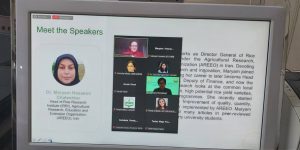 In the first part of the sessions, Dr. Hossieni told her life story about her educational background and entrance to the research (especially rice research). With the emphasis on the effective role of extension and communication of research with farmers, she briefly described her experiences on rice participatory breeding to introduce new rice cultivars during the last 20 years and the impact of researcher-farmer partnership to achieve the desired results in the paddy field.
In the first part of the sessions, Dr. Hossieni told her life story about her educational background and entrance to the research (especially rice research). With the emphasis on the effective role of extension and communication of research with farmers, she briefly described her experiences on rice participatory breeding to introduce new rice cultivars during the last 20 years and the impact of researcher-farmer partnership to achieve the desired results in the paddy field.
Director-General of the Rice Research Institute of Iran also explained how much the certified rice seeds and the purification of local masses (her last research finding) are important and played meaningful impacts on Iranian rice production and increasing the income of smallholder farmers.
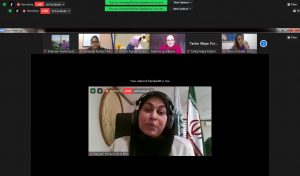 In continue, Dr. Hossieni addressed the position of research and innovation in Iran and said that according to sociological studies the effective and strong relationship between researchers and the extension officers in rural communities of smallholder ownership is considered to be the central driving force for achieving agricultural development in farmers’ field. She also emphasized that wherever researchers and farmers collaborate and stand together, the problems of rice production are fully recognized, prioritized and the solutions successfully identified. Consequently, through on-farm training of research findings for the pioneer farmers push the country towards food and nutritional security.
In continue, Dr. Hossieni addressed the position of research and innovation in Iran and said that according to sociological studies the effective and strong relationship between researchers and the extension officers in rural communities of smallholder ownership is considered to be the central driving force for achieving agricultural development in farmers’ field. She also emphasized that wherever researchers and farmers collaborate and stand together, the problems of rice production are fully recognized, prioritized and the solutions successfully identified. Consequently, through on-farm training of research findings for the pioneer farmers push the country towards food and nutritional security.
In the role of women on Asian-Pacific working in agricultural research, extension and policy system, Dr. Hossieni, Director General of the Rice Research Institute of Iran by focusing on the critical role of Iranian women working in paddy field said: whenever the men and particularly women working in the paddy field participated in my research works, the findings of this research has been welcomed by all farmers.
She by pointing to the effective role of women in contributing towards national food security said: women across the world must believe in themselves and their abilities and powers and must boost their confidence in their workplace. In continue, she introduced the last innovations in the agricultural sector of Iran, especially rice, and invited the Apaari and FAO to collaborate for exchange germplasm exchange and joint projects. Dr. Hosseini, along with other speakers, sent a message to women around the world urging women to be strong and do not spare any effort to achieve success.
At the end of her speech, , Dr. Hossieni, Director General of the Rice Research Institute of Iran added: It is a great pleasure for me to appreciate this meeting organizers, APAARI, FAO for giving me the opportunity to share my success, challenges, and lessons as innovators and influencers of change in rice research and extension. I also appreciate Dr. Vali nassab, Director General of academic relations and international affairs of Agricultural Research, Education and Extension Organization (AREEO) for his valuable efforts and kindly help with meeting registration.
 Also in this event, inspiring women working in agricultural research, extension, and policy in Bangladesh, Bhutan, Cambodia, India, Indonesia, Iran, and the Pacific Islands, and representatives of APAARI and FAO discussed and shared their experiences and what they need to be done to address the challenges facing women in research and extension across the Asia-Pacific region.
Also in this event, inspiring women working in agricultural research, extension, and policy in Bangladesh, Bhutan, Cambodia, India, Indonesia, Iran, and the Pacific Islands, and representatives of APAARI and FAO discussed and shared their experiences and what they need to be done to address the challenges facing women in research and extension across the Asia-Pacific region.

